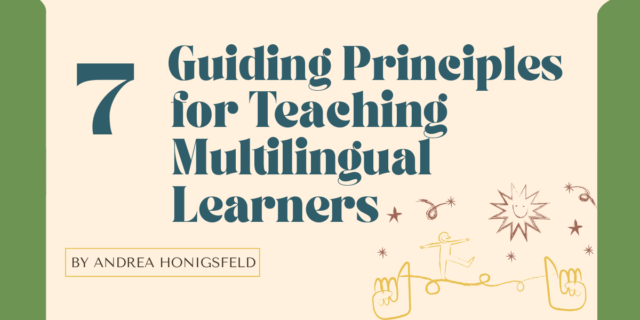
Teaching is a profession that elicits a myriad of questions throughout the day, from the rhetorical to pedagogical. Finding intellectual space to ponder these questions in a way that will impact practice can be tough, and we want to help. Our new series, “In The Quiet: Reflections on Learning” invites you into the mind of an expert in the field through a brief Q&A. So, wherever your quiet is—after the bell, on the commute, or elsewhere—please enjoy this space to reflect as you hone your craft.
We continue our reflections on learning with Viviana Hall, a native of Colombia with twenty years of experience in bilingual education and co-founder of Global VIDA, an organization with a vision to end the current teacher shortage in bilingual education.
![]()
What feels most important for multilingual learners' success in today's K-12 classrooms?
![]()
As we continue to see the globalization wave impacting our classroom populations, the best first step toward success begins with inclusion and validation of students’ identity, heritage, and language. If we open spaces for students to share about themselves, it will broaden today’s approach from a classroom structure that is just teaching English to one that is a valuable multicultural experience. A new universal learning design could expand to achieve a true pluralistic approach in every classroom—a teaching and learning experience that goes beyond being able to coexist together to enriching all students’ life by empowering minority groups to participate fully (Cummins J.,1986). After the pandemic, there is no reverse for a global community expansion and inevitably, the U.S. culture is in a continuous state of change. Unless teachers are able to understand the diverse needs of their students, it will be difficult if not impossible to teach them effectively (Gollnick, D.M., Chinn, P.C., Kroeger, S.D., Bauer, A.M., 2009).
![]()
What seems to be the most common challenge that teachers of multilingual learners face? What guidance would you give any teachers facing a similar challenge?
![]()
The ideal way to overcome challenges for both teachers and students would be to focus on optimal preparation. ESL teachers are expected to be knowledgeable of multicultural aspects in a diversified student population, but this is not always part of their teacher training programs. When reviewing teachers’ certification exams, questions about working with diverse learners are not included much in the exam content. This gives the impression that teachers are fulfilling profession requirements on the job rather than receiving the appropriate previous preparation. In the same token, curriculum objectives for students’ academic content rarely includes lessons about multicultural perspectives. Our most common challenges could be overcome with better and timely preparation that adequately includes diversified perspectives.
![]()
Can you share one of your favorite strategies for supporting learners acquiring English?
![]()
My favorite strategies are always routines that scaffold using hands-on experiences. Using this type of strategy, it is possible to make every lesson more organic and flexible enough to meet all different learners’ needs. In fact, the best way to include everyone in the lesson delivery is when we design the lesson for students in the margins. In other words, targeting those that we often miss could end up aiming a more inclusive lesson that considers all levels of learning. A good three-step sequence for strategy design could be as follows:
1) Identify levels of proximal development and know when students are ready to move to the next level.
2) Use a modified gradual release of responsibility to allow for more than one guided practice model, aiming to additional support for students who are not native English speakers.
3) Maximize opportunities for transferability of reading skills between languages.
![]()
As a learner, what professional learning experience has had the most positive impact on your teaching career?
![]()
Professional development that goes beyond theory has had the most impact on me. When I became a consultant and started my own organization, I wanted to find a bridge to connect theory and practice. I had witnessed first-hand how bilingual/ESL teachers were highly immersed in theoretical knowledge, but many times felt unsure about how the theories would play out in the classroom. In fact, when I published my first book in partnership with the Texas bilingual teacher of the year in 2018, we intentionally decided to include NO theory in any of the pages. It is a book that features nothing but strategies to be used in the bilingual/ESL classroom that stem from the main theories in second language acquisition.
Please also see the related blog, Reflections on Learning: Multilingual Learners, for more multilingual learner support.


